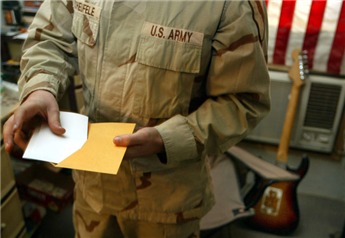N.Y. To GIs: No Votes For You!

A soldier prepares to mail in his
completed absentee ballot after voting in
the American Presidential and Congressional
election while at Camp Eagle.
Election '10: The de facto disenfranchisement of soldiers by an incompetent Board of Elections is a shameful slap in the face of those who are fighting and dying in two wars to protect our right to vote and theirs.
There's no excuse for this. None. The failure of the state of New York's Board of Elections to send out absentee ballots to the state's military and overseas voters, even after being granted a federal extension under the Military and Overseas Voter Empowerment (MOVE) Act, is made worse by the fact that New York City on 9/11 was the Pearl Harbor of the war on terror.
We agree with New York City Mayor Michael Bloomberg on this one when he said: "We send our young men and women overseas to fight and to die for us and we don't care enough to make sure they get the right to exercise their franchise? That's what they're over there fighting for as much as anything else."
The Department of Justice has belatedly threatened a lawsuit to force compliance with federal law now that it's become headline news, but the feds should have been on top of this a long time ago. Perhaps DOJ was too busy protecting the right of the New Black Panthers to intimidate voters.
"A credible enforcement operation would have detected a problem on Oct. 2," says J. Christian Adams, a former Justice Department attorney who gave testimony before the U.S. Civil Rights Commission about DOJ's refusal to prosecute the Black Panthers. "DOJ didn't detect it, and almost two weeks later, the situation has become critical in New York and other states. The only place they have sued to enforce the law? Guam."
Recently we editorialized on how DOJ was asleep at the switch regarding monitoring compliance and enforcement as five states — Delaware, Massachusetts, New York, Rhode Island and Washington — were granted waivers extending the late September deadline. New York was granted a 15-day extension that expired Oct. 1.
The MOVE Act, passed with overwhelming bipartisan support last year, says states must provide overseas ballots 45 days before a federal election. Waivers can be granted under certain circumstances, but only if states can prove that the votes of service members can still be cast and counted.
Currently not complying with federal law to ensure that our soldiers are not denied their right to vote are New York City and four counties — Putnam, Erie, Niagara and Westchester. In all, there are 49,468 registered overseas voters in New York state, 20,172 of whom are in the military. In the five boroughs, there are 36,446 registered overseas voters, including 6,557 who serve in the armed forces, according to New York state election officials.
This is the type of unresponsive and uncaring government that gave rise to the Tea Party.
If these were minority voters in the Deep South who tend to vote Democrat, and if the law being violated was the Voting Rights Act of 1965, would DOJ's pace have been quicker? We hesitate to wonder if the fact that military voters of all colors and genders tend to vote about 3-to-1 Republican is the reason DOJ has been dragging its feet.
"The gravity of New York's failure cannot be overestimated," says Eric Eversole, a former Justice Department voting section attorney who recently started a nonprofit organization, the Military Voter Protection Project, to protect military voting rights. "With approximately 50,000 military and overseas voters in New York City alone, there is no doubt that the November elections could be altered by this failure."
American blood has been shed around the globe for centuries for the sacred right to vote.
We remember the proud Iraqi woman who held up her finger stained with purple ink to show that she had voted in Iraq's first free and democratic elections.
American soldiers died to give her that right and to protect our right to choose our leaders. No disinterested, incompetent or otherwise motivated public official should be allowed to stand in the way of a soldier's right to vote.

